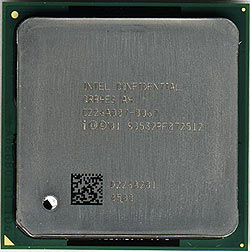Intel Pentium 4 2.8 GHz Processor Review
The
Intel Pentium 4 processor has come a long way in the last two years. These
days, if you want a top of the line system, it's going to have a Pentium 4
inside. Yes, AMD's AthlonXP 2700+ and 2800+ processors are just as
powerful, its just that they're almost impossible to find for
retail sale while the P4 2.8 GHz has been easily available since its'
introduction.
Ever since the
Northwood core was been introduced, Intel
has been in front in terms of performance,
and perhaps more importantly, availability. What makes the Intel Northwood P4 so attractive is
that Intel has doubled the size of the L2 cache. With 512KB of L2 cache
the performance penalty for having a long CPU pipeline has been dramatically reduced. To
top things off, Northwood Pentium 4's are great overclockers. Many 1.6A and
1.8A P4's have no problem hitting 2.4 GHz+ with retail cooling!

So what's new with the P4 2.8 GHz processor other then clock speed? The CPU
is based on the new C1 core which uses the new enhanced, shrunken, Northwood core
which has a surface area of only 131 mm2. Non-enhanced B0 steeping
Northwoods are 145mm2 in size.
C1 stepping Northwood P4's
also run on a higher voltage of 1.525V as opposed to 1.5V for the B0
based Northwood's. Looking at the bottom of the processor we see that
Intel is using larger resistors.
Overclocking to 2.8GHz P4:
Even though I'm currently playing with the fastest (retail-available)
processor in the world, it's still not fast enough for me. =)
Using the retail
cooler (temperatures never exceeded 50 degrees celsius during testing) we began
to up the FSB slowly. Unfortunately I hit the wall at 147 MHz FSB which only
gives us 3.09 GHz while using 1.6V. No matter what voltage I gave the CPU, I
couldn't go above that mark. I think the limitation may be due to other hardware; namely
the PSU.
Unfortunately we recently had to swap out the trusty Antec 400W PSU
for a 300W version recently. Using Antec's 300W PSU I've been noticing problems overclocking
previously tested components to the same level as tested before.
| pcstats
test system specs: |
|
|
computer hardware:
|
|
| processor: |
AthlonXP 2700+
Pentium 4 2.66 GHz
Pentium 4 2.8
GHz |
| Clock
Speed: |
13 x 166 MHz = 2.16 GHz (XP 2700+)
20 x 133 MHz = 2.66
GHz (P4)
21 x 133 MHz = 2.8 GHz (P4)
21 x 147 MHz = 3.09 GHz |
| Motherboards: |
Albatron PX845E Pro*
Epox 8K3A+ |
| Chipset: |
Intel i845E
VIA KT333CE |
| Videocard: |
ATi Radeon 9700 Pro |
| Memory: |
256MB Corsair XMS3200 CAS2 |
| Hard
Drive: |
40GB Samsung SP4004H |
| CDROM: |
NEC 52x CD-ROM |
| Floppy: |
Panasonic 1.44MB Floppy Drive |
| Heatsink: |
Retail Intel HSF
Thermalright SK-6
w/40 CFM YS Tech |
| PowerSupply: |
Antec 300W PSU |
| Software
Setup |
WindowsXP Build 2600
Intel INF
4.00
VIA 4in1 4.43V
ATi Catalyst 2.3 |
| Benchmarks |
SysMark 2002
Business Winstone 2002
Content Creation
2002
Super Pi
POVray
SiSoft Sandra 2002
Pro
3DMark2001 SE
Quake III
Arena |
* - The Albatron PX845EPro enables a
3/4 memory divider by default at 133 MHz.

